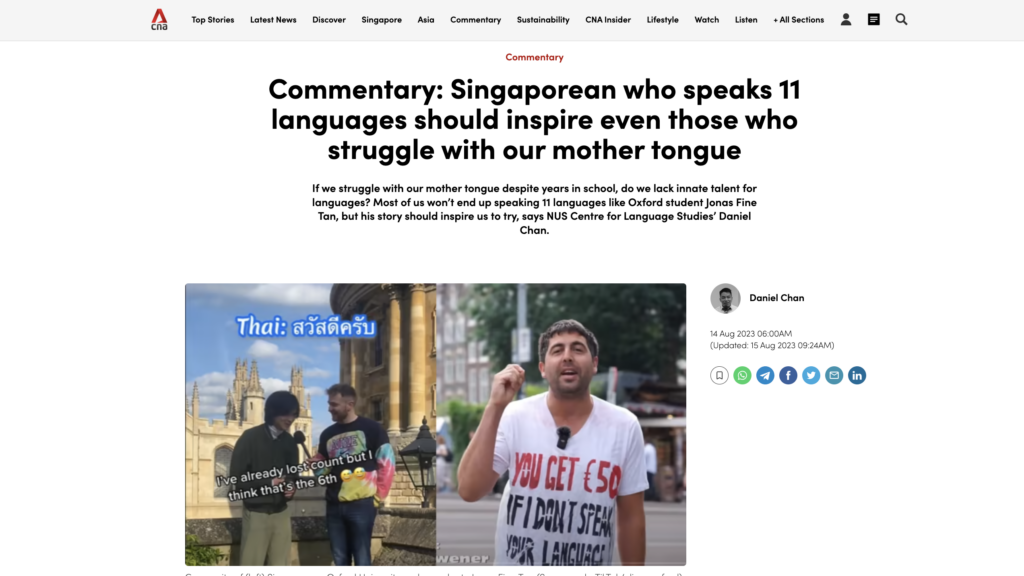News
Commentary: From ‘skibidi’ to ‘tradwife’, dictionary entries are never neutral
IN BRIEF | 10 min read
- By Dr Daniel Chan, Assistant Dean (Office of Programmes) at FASS, and Senior Lecturer of French at the NUS Centre for Language Studies.
Click through image below to read this piece.
This story first appeared on CNA Online and on NUSNews on 29 September 2025.
NUS Open House 2024 Attracts more than 8.4m visitors as Screens and Campuses Buzz with Action
IN BRIEF | 10 min read
- Open House 2024 returned to an enthusiastic reception as visitors turned up in force to experience one of NUS' largest events of the year. Held in a hybrid format from 2 to 9 March 2024 and pulled together by the efforts of 2,674 faculty, staff, students and alumni, the event attracted more than 8.4 million visitors - up from 7.7 million in 2023 - as they explored the comprehensive showcase of what NUS has to offer both online and in-person.
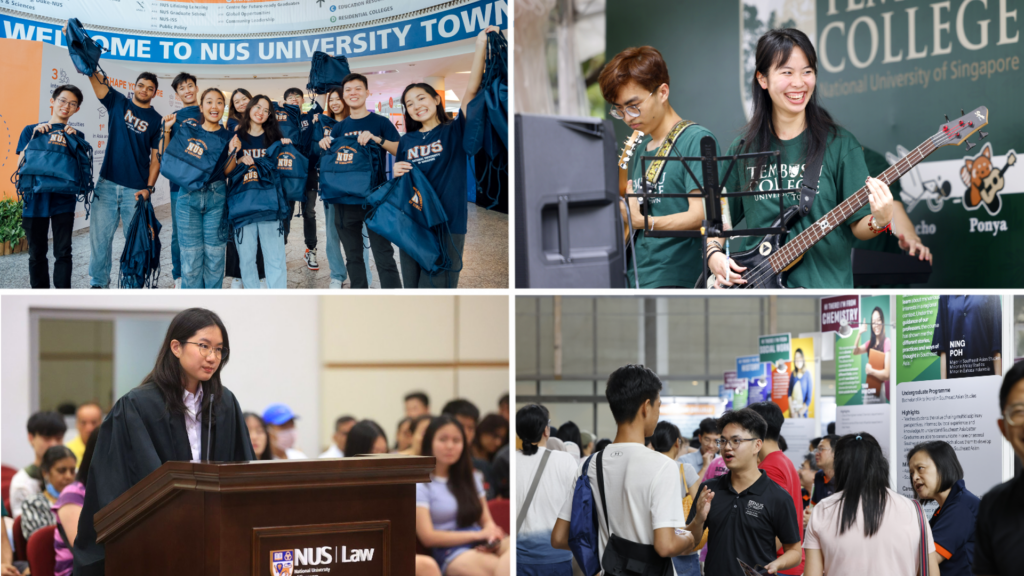
Open House 2024 returned to an enthusiastic reception as visitors turned up in force to experience one of NUS' largest events of the year. Held in a hybrid format from 2 to 9 March 2024 and pulled together by the efforts of 2,674 faculty, staff, students and alumni, the event attracted more than 8.4 million visitors - up from 7.7 million in 2023 - as they explored the comprehensive showcase of what NUS has to offer both online and in-person.
Kicking off the eight action-packed days was a slate of engaging virtual talks, webinars, and social media sessions. NUS Business School put together an informative line-up of virtual sessions featuring an Ask-Me-Anything session with its Vice Dean Associate Prof Chng Chee Kiong, an overview of the various majors with insights from faculty and students alike, and a glimpse of its vibrant student life via the Bizad Club.
At the online showcase by NUS Computing, prospective students joined a Discord live chat to get their questions answered by professors and student ambassadors on topics such as the differences between the school's five degree programmes. During a Zoom session by NUS Global, they heard about the University's exciting study abroad opportunities from students who embarked on exchange programmes with universities in Scotland, Canada, Switzerland and Hong Kong.
The on-campus segment on 9 March saw crowds throng the programme booths, talks, special classes, campus tours, student life performances and residential venues, with students gaining perspectives into all aspects of a world-class education at NUS, from the comprehensive curricula and career prospects to student life and global opportunities.
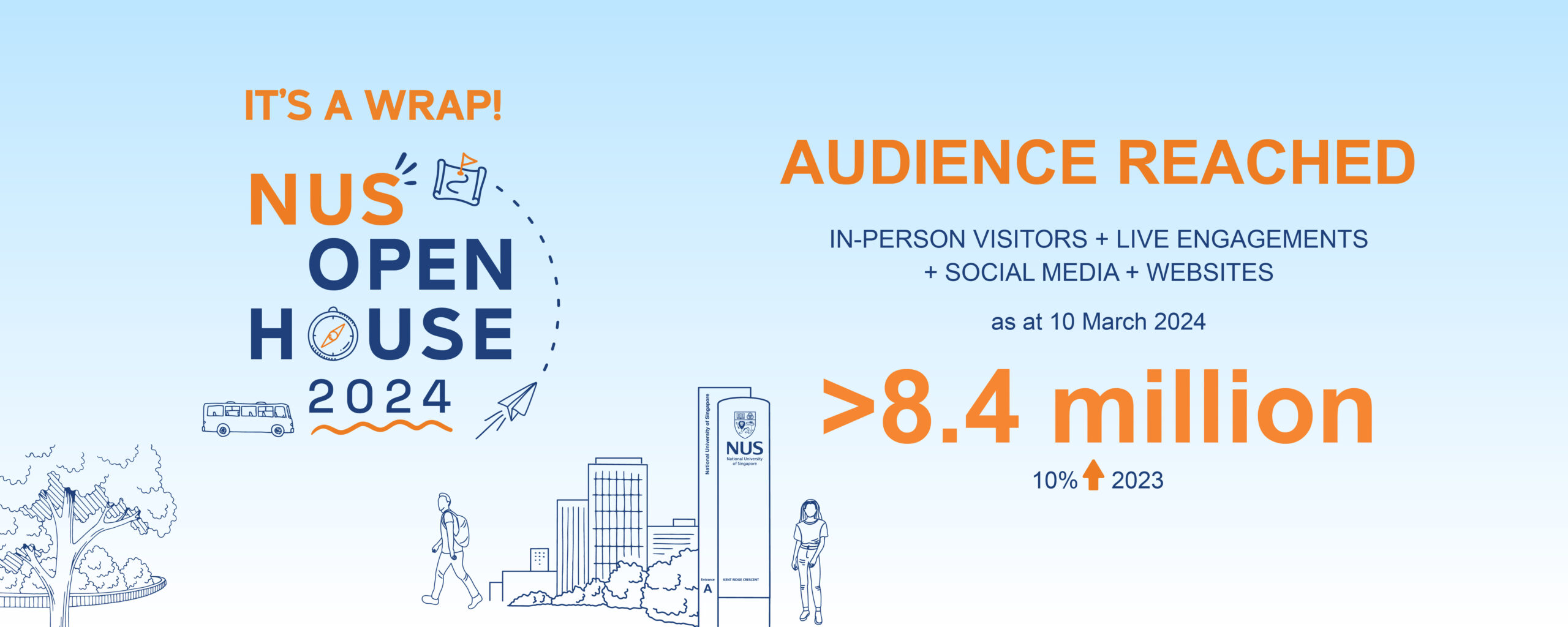
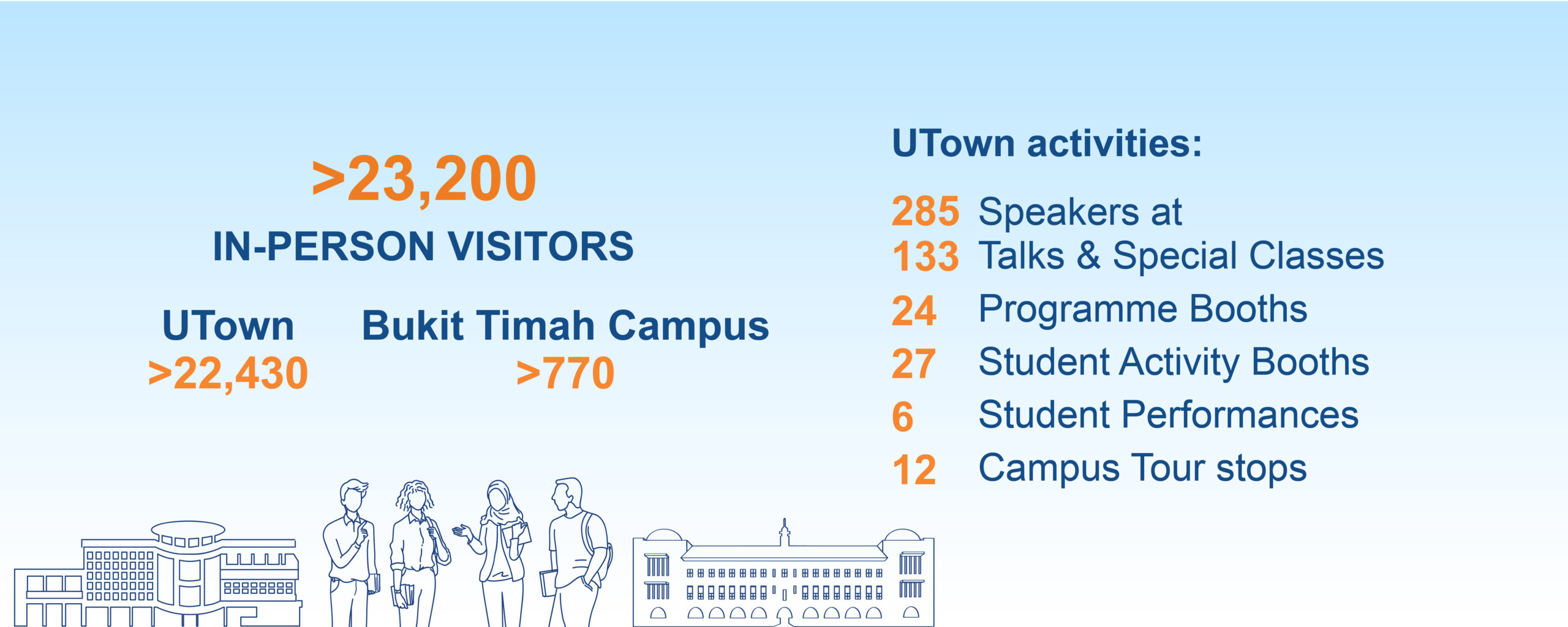


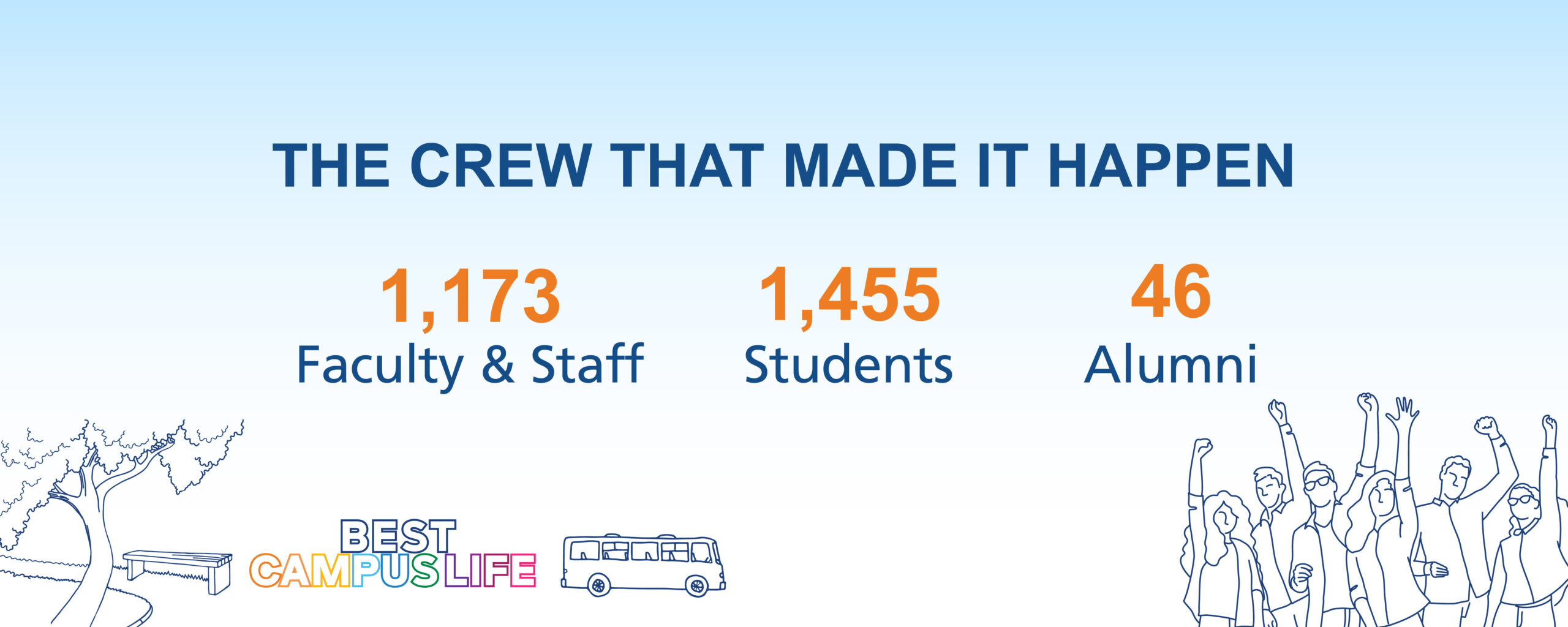 "The NUS Open House was an absolute delight! It provided me with invaluable insights into campus life and academic offerings," said prospective student Sim Wen Hao, who is currently in national service. "From informative discussions to first-hand testimonials, every interaction left me feeling more confident about my potential home away from home."
"The NUS Open House was an absolute delight! It provided me with invaluable insights into campus life and academic offerings," said prospective student Sim Wen Hao, who is currently in national service. "From informative discussions to first-hand testimonials, every interaction left me feeling more confident about my potential home away from home."
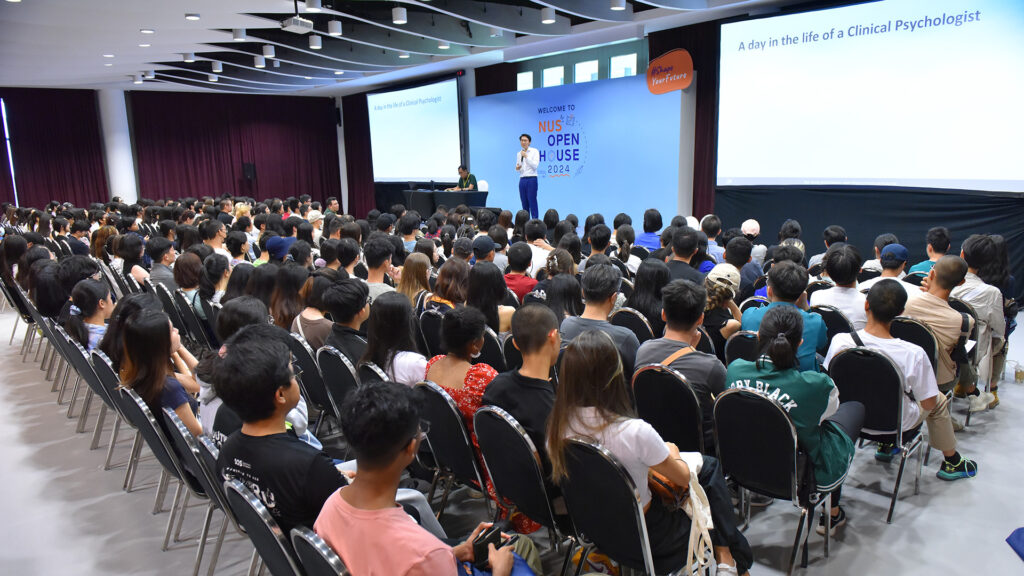
Charting pathways in humanities and sciences
The College of Humanities and Sciences (CHS), comprising the Faculty of Arts and Social Sciences (FASS) and the Faculty of Science (FOS), showcased how it is equipping students with skills to integrate knowledge across these domains and the wide range of programmes they can choose from through a variety of major and minor combinations.
An FASS panel featuring a Geography major, a Political Science major with a minor in Economics, a Philosophy major pursuing a Double Degree, and a Southeast Asian Studies major taking a minor in History dispelled misconceptions about their disciplines while discussing the potential career paths. Another joint talk by Psychology and Social Work on addressing mental health challenges in the 21st century explored how the issue is approached from their respective disciplines.
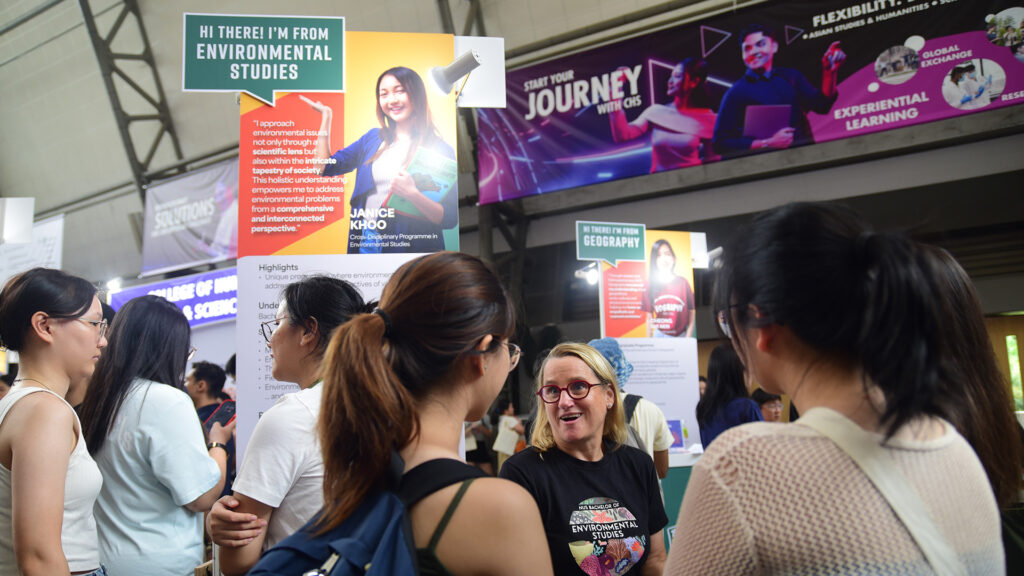
The boom in big data was the focus of the Data Science and Analytics talk that highlighted how the programme offers students industry exposure through real-world projects and internships. Another talk by the Environmental Studies Cross-Disciplinary Programme discussed its mission to develop environmental sustainability advocates keen to derive creative solutions to complex problems, along with its exciting fieldwork opportunities.
Lee Sue Ning, a Hwa Chong graduate who is interested in applying to Psychology, said of the FASS student panel: "The four students were from courses that I would never have considered. Hearing their experiences opened new doors for me, making me consider these courses as possible minors that I can take," she added.
Intersection of design and engineering
The talk on Chemical Engineering, Materials Science and Engineering, and Biomedical Engineering, held by the College of Design and Engineering (CDE) gave students valuable insights on the curriculum and disciplines, as well as showcased students' research. In an Ask-Me-Anything panel, the professors also shared about the flexibility of the curriculum, future career prospects, intersections between the various fields of engineering, and their thoughts on the most challenging yet rewarding aspects of taking a degree in Engineering.
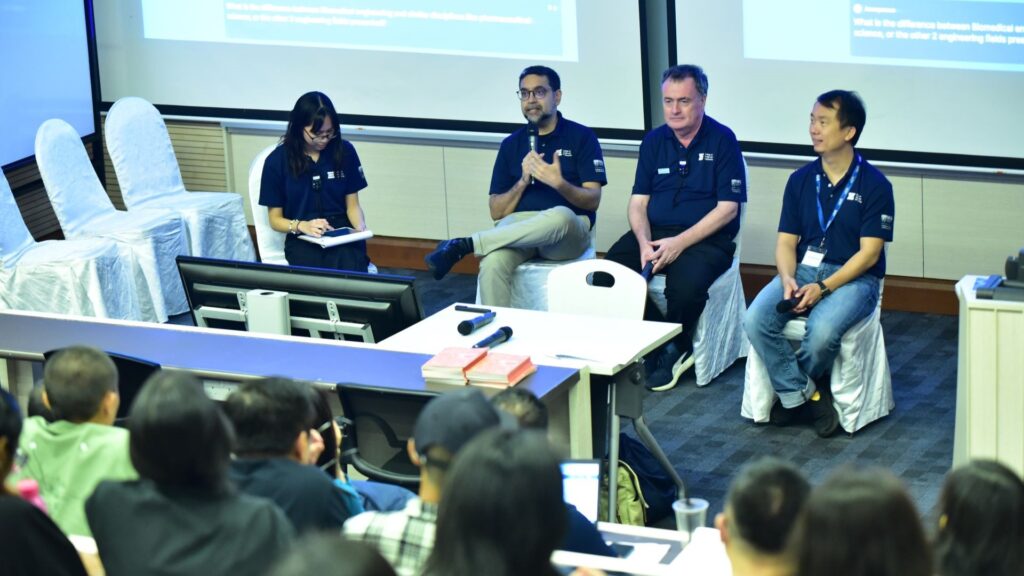
The talk on Architecture, Industrial Design, and Landscape Architecture gave students the inside scoop on how the programmes provide the core foundation, training, skills, and knowledge for students to become the next generation of effective and innovative architects and designers.
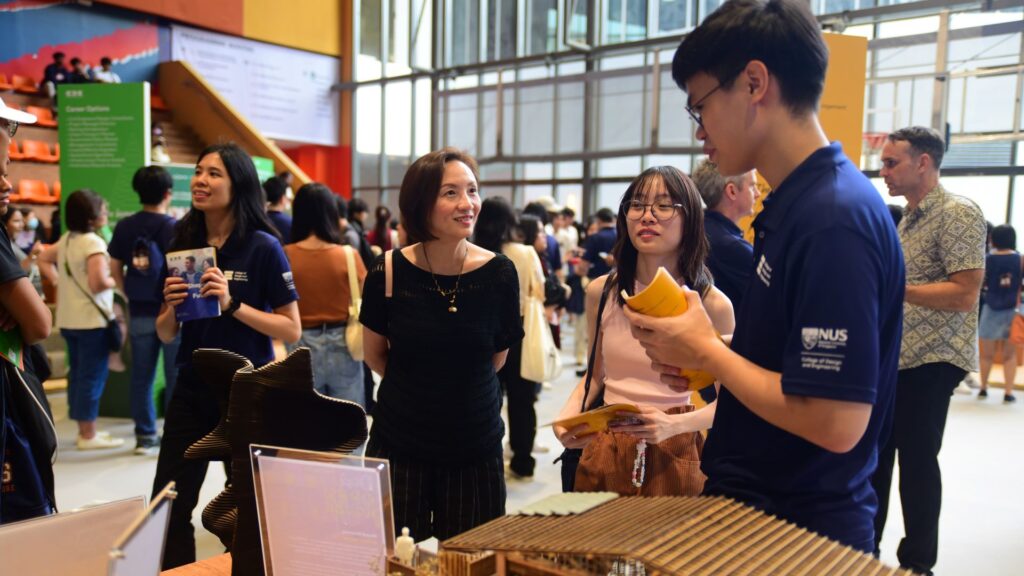
Over at SDE3, CDE's Built Environment Research Tour took participants behind the scenes-from live demonstrations of how 5G robotics reduce manpower and increase efficiency, to a lab tour of NUS' hydraulics laboratory facilities to explore wave mechanics and how natural coastal ecosystems like mangroves can protect shorelines against climate change. Students also participated in a hands-on session to design their own shoreline adaptation, choosing from models of nature-based solutions as well as traditional infrastructure.
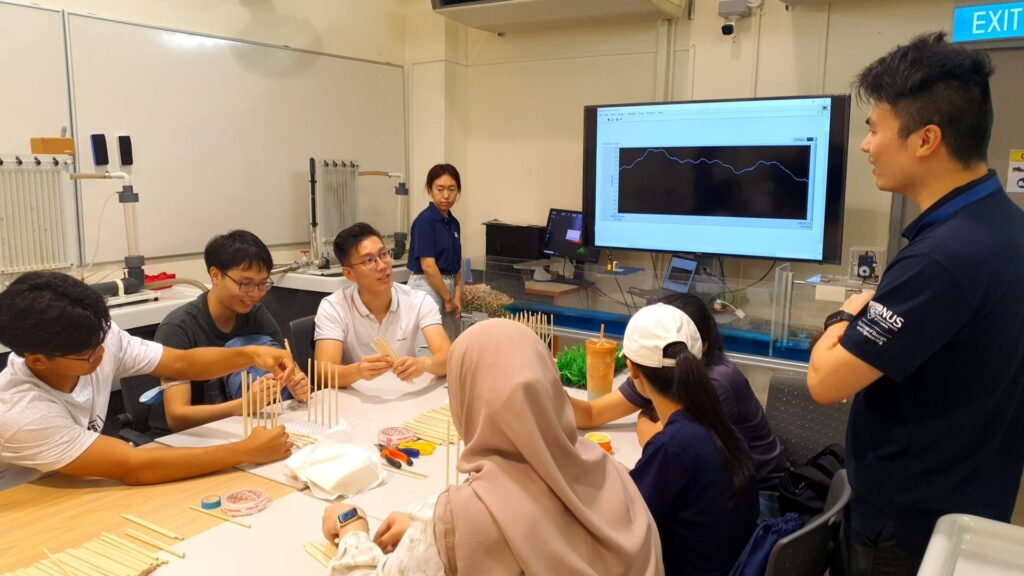
"It was nice to be able to see the facilities and get an idea about what Singapore is currently trying to improve on-designing a world with humans and robots, and coastal protection," Nur Annatasyia Binte Joferi, from Singapore Polytechnic, said. "It made me think about how things will progress and what comes next after those goals are met."
Immersive learning experiences
NUS College offered prospective students a window into its extensive interdisciplinary education that blends small-group seminars with experiential learning and a rich residential immersion through special classes on topics such as love, food, and even Shakespeare's plays. During Dr Chan Chi Wang's class on quantifying facial attractiveness using mathematics and statistical methods, prospective students busily plotted measurements of facial features on graph paper. In Associate Professor Stuart Derbyshire's class, they decoded mysterious sounds and intriguing illusions - sometimes with the aid of 3D glasses - understanding the science behind brain mechanisms that influence our perception.
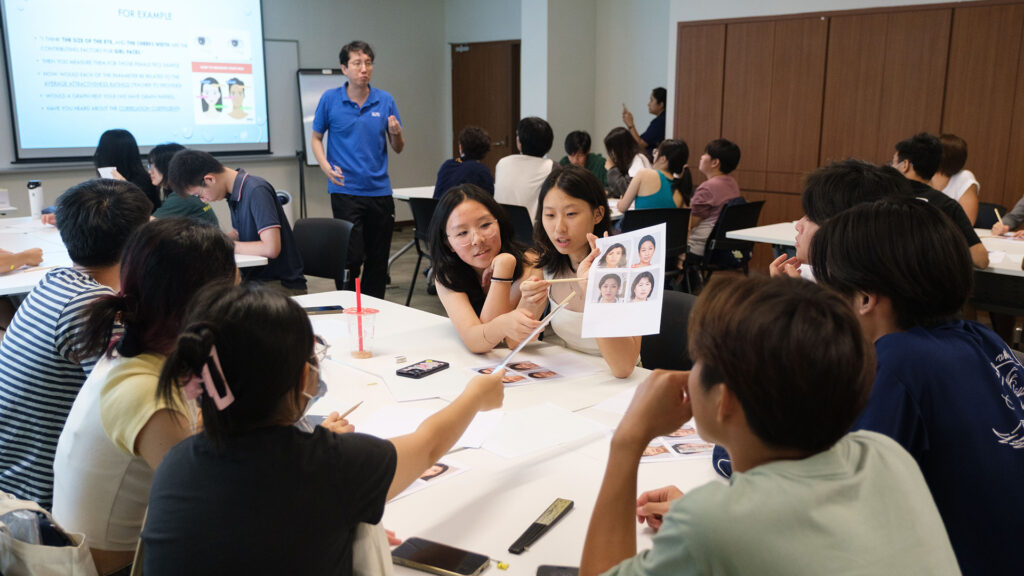
Foo Jun Wei, a Hwa Chong Institution graduate who will be joining Computer Science and NUS College, came away with useful information on what to expect as an incoming NUS student. "I enjoyed taking part in the guided tour where I got to see first-hand the facilities and accommodations that NUS College provides, as well as the immersive sample lesson on quantifying facial attractiveness. Above all, I was glad to be able to clarify my existing doubts and seek advice from the friendly student ambassadors on the ground," he added.
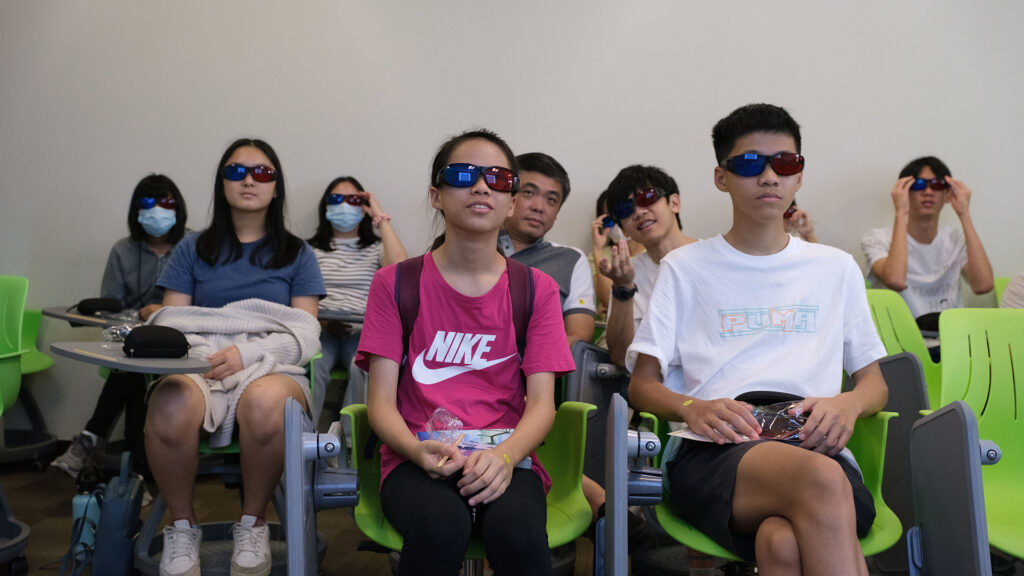
Over at Bukit Timah Campus, visitors to NUS Law had the choice of two masterclasses on criminal justice and conflict resolution approaches. At its mock moot sessions, visitors sat attentively in the gallery witnessing a simulation of a court case.
Mastering the 'heart' and science of healthcare
Prospective students interested in Medicine, Dentistry, Nursing and Pharmacy had the chance to find out about the new Common Curriculum for Healthcare Professional Education, which has been designed to align with Singapore's shift towards preventive healthcare. Aside from touching on the Common Curriculum, talks by NUS Medicine offered an overview of its academic journey, highlighting features such as its strong mentorship support and Pathway programmes aimed at broadening their skill sets. During a special class by NUS Nursing, visitors tried out basic nursing skills like using a stethoscope and learnt the importance of collaboration between healthcare professionals.
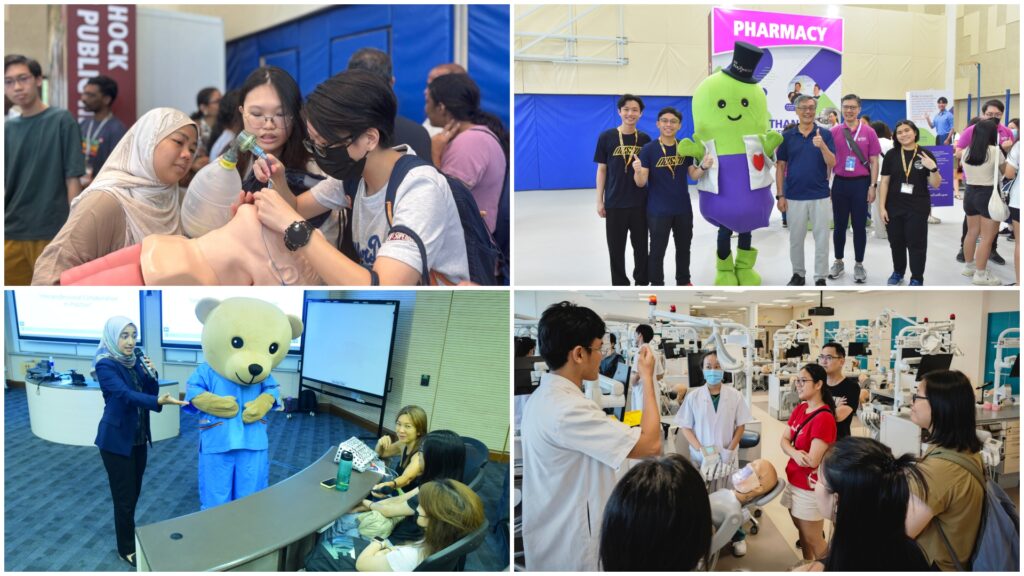
Prospective students interested in Medicine, Dentistry, Nursing and Pharmacy had the chance to find out about the new Common Curriculum for Healthcare Professional Education, which has been designed to align with Singapore's shift towards preventive healthcare. Aside from touching on the Common Curriculum, talks by NUS Medicine offered an overview of its academic journey, highlighting features such as its strong mentorship support and Pathway programmes aimed at broadening their skill sets. During a special class by NUS Nursing, visitors tried out basic nursing skills like using a stethoscope and learnt the importance of collaboration between healthcare professionals.
The interactive Pharmacy masterclass, titled "Unveiling the Pillars of Pharmacy: The Science and Art of Medication Therapy", saw prospective students participate in the decision-making process of a real-life clinical case study. They also gained insight into how NUS Pharmacy structures its curriculum to incorporate live interactive classes, science practicals, skills labs, and collaborative learning workshops, to help students apply concepts in real case studies.
Prospective student Wong Hon Wei from Anderson Serangoon Junior College said, "The Pharmacy masterclass was quite enjoyable yet unique, as the way the collaborative learning workshop was structured was engaging, incorporating the Biology and Chemistry concepts learnt in classrooms into real-world medical applications."
Innovating solutions for society and the world
Another popular feature at this year's Open House was the Innovation and Impact Hub, which showcased groundbreaking projects by students from CDE, Chua Thian Poh Community Leadership Centre, NUS College, and FOS that are making a tangible impact on society and the world.
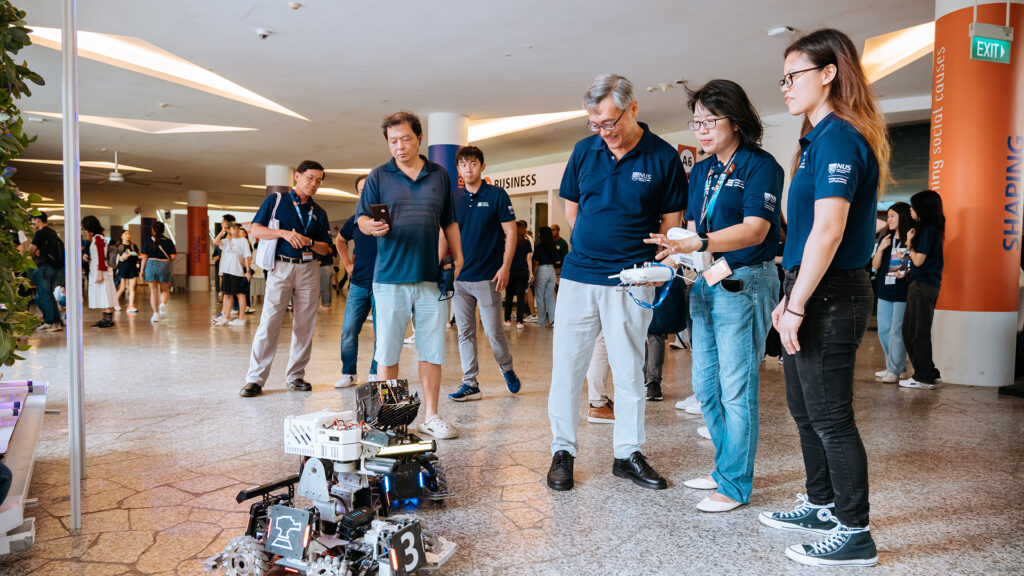
Visitors caught the interactive projects in action, from The Moving Farm, a movable modular tower system for hydroponics farming that increases crop yield sustainably, to TinkerThings, a project on AI-based gamified activities innovated to improve seniors' mental wellbeing and cognitive faculties.
Aside from exploring academic pathways, visitors also discovered NUS Enterprise's suite of entrepreneurship initiatives, including the NUS Overseas Colleges, NUS Enterprise Summer and Winter Programmes in Entrepreneurship, and incubation hub THE HANGAR.
At a panel session on student entrepreneurship, prospective students heard from NUS alumni who founded three start-ups - Pitchspot, Wateroam and Skilio. The founders shared how their involvement in Enterprise's entrepreneurship programmes and the support they received through the HANGAR enabled them to nurture their business ideas.
Exciting array of student and residential life activities
Over at the Student Village, a smorgasbord of vibrant student performances took Town Plaza by storm throughout the day, treating visitors to an exhilarating kaleidoscope of talent from student clubs and interest groups.
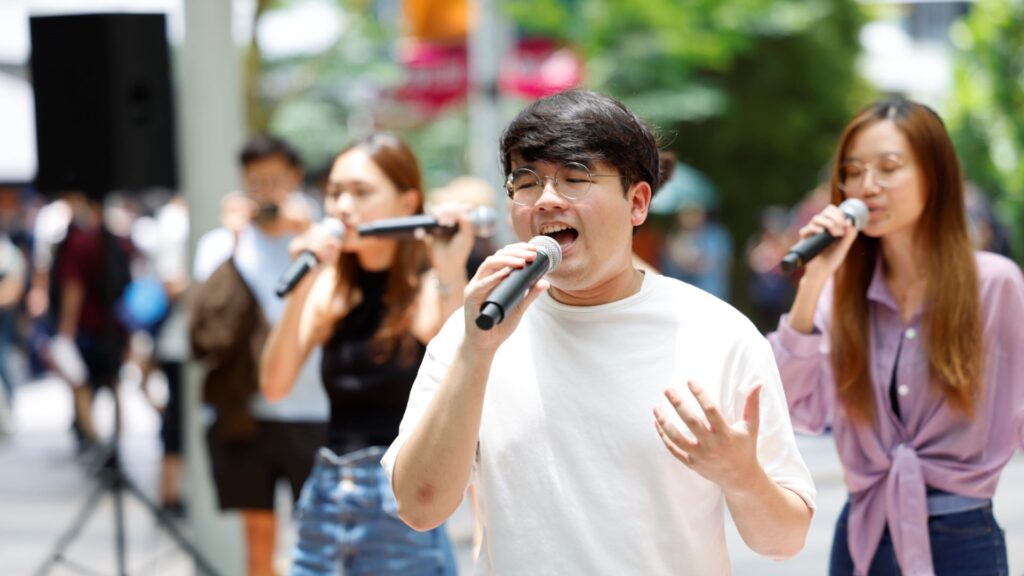
Getting a glimpse of the diverse student life opportunities that await, visitors were hyped up by the energetic cheerleading displays of King Edward VII Hall's KE Titans, the snazzy beats of NUS Rappers, and the slick dance moves of the NUS Korean Cultural Interest Group. They were also serenaded with catchy tunes from the Sheares Hall band, a capella group NUS Resonance, and NUS Fingerstyle Guitar.
On top of A-Day-in-the-Life videos and 360° virtual tours of the various Residential Colleges, Halls, and Houses, Masters and student representatives from the residences mingled with prospective students at the booths, talks, and Ask-Me-Anything panels, where they shared their insights and anecdotes on the on-campus experience, as well as the distinct culture of each residential unit.
Along with offering guided in-person tours and simulated classes, the residential units also showcased the interest groups available. Other engaging activities, such as Tembusu College's live performances and Ridge View Residential College's sports experience zones, coffee pour demonstrations, and warli art making gave prospective students a taste of the many facets of holistic residential life.
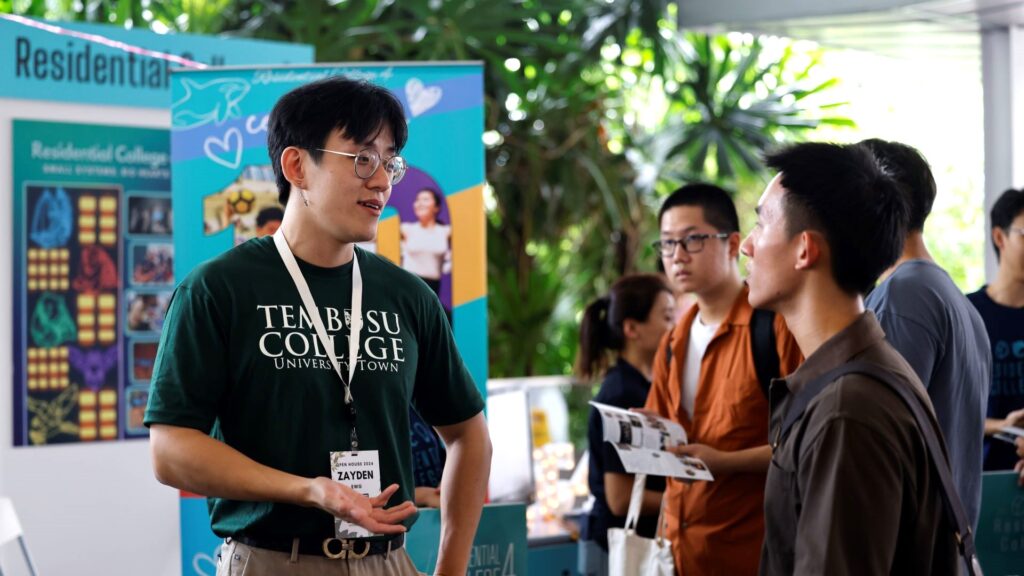
Prospective students Inez Ang from National Junior College and Vishnu Raj from Millennia Institute said the residential showcase gave them a better picture of living on campus.
Runyi Zhang, a graduate of St Andrew's Junior College who is applying to Business, said she had an enlightening experience sampling both the academic and extracurricular options. "Through the Open House, I've managed to capture a glimpse of student life in NUS… allowing me to have a clearer and more vivid image of what my future could be like here," she added.
This story first appeared in NUSNews on 14 March 2024.
Singaporean who Speaks 11 Languages Should Inspire Even Those who Struggle with our Mother Tongue
IN BRIEF | 5 min read
- A commentary piece on CNA Online by By Dr Daniel Chan, Assistant Dean (Undergraduate Studies), FASS, and Deputy Director of the NUS Centre for Language Studies.
Click through image below to read this piece.
This article first appeared on CNA Online and on NUSNews on 14 August 2023.
NUS Open House: More than 7.7M Visitors Drawn to Action-Packed Showcase over 10 Days
IN BRIEF | 25 min read
- NUS Open House 2023 saw a strong showing by visitors eager to find out about the University’s academic programmes, as it returned in from 25 February to 6 March. Some 7.71 million visitors attended the physical and online showcase which involved 3,071 faculty and staff, students and alumni.
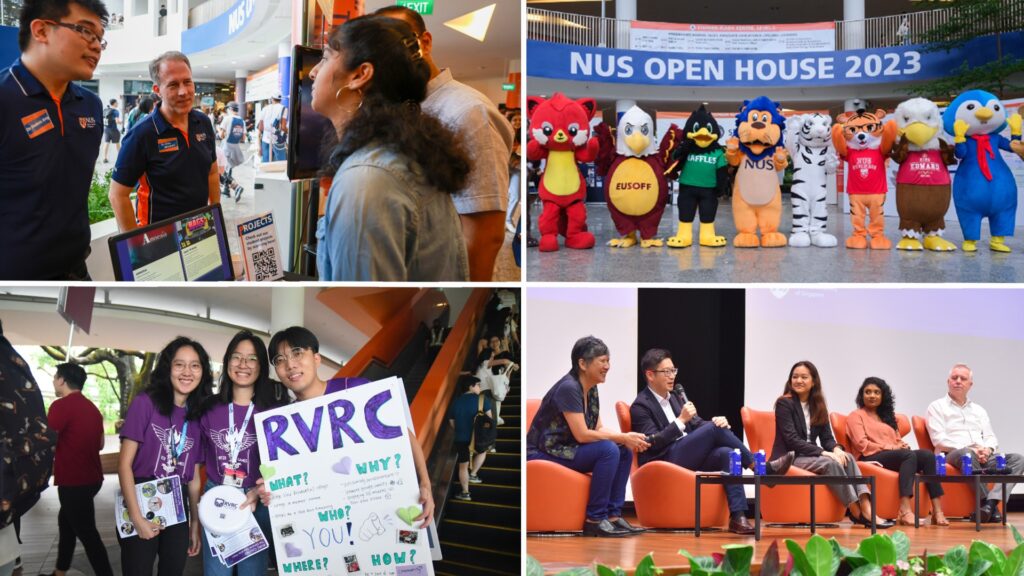
NUS Open House 2023 saw a strong showing by visitors eager to find out about the University’s academic programmes, as it returned from 25 February to 6 March. Some 7.71 million visitors attended the physical and online showcase which involved 3,071 faculty and staff, students and alumni.
Kicking off the 10 action-packed days were the informative virtual talks, webinars, and social media sessions. The on-campus event on 4 March saw packed crowds at the programme booths, talks, special classes, campus tours, student life performances and residential venues despite the heavy downpour. Prospective students gained valuable insights from faculty members, explored the University’s extensive global opportunities, as well as its diverse entrepreneurship platforms and lifelong learning courses, giving them a comprehensive overview of what NUS has to offer.
“I really enjoyed meeting the professors and students who are from the courses I'm interested in as I gained many insights from them on life in NUS and the various possibilities that are open for exploration,” said prospective student Karthika Warrier, an alumna from Raffles Institution who is considering applying to NUS Computing or the College of Humanities and Sciences (CHS).
Jasmine Chiam, an alumna from Nanyang Junior College (NYJC) who is interested in applying to CHS and NUS College, agreed. “The programme was well-run despite the fact that it was raining,” she said. “I felt that it was well-curated for students with different interests.”
A draw for many prospective students were CHS, the newly launched NUS College, and the College of Design and Engineering (CDE) – the University’s recent interdisciplinary pathways aimed at meeting the evolving demands of the workforce.
Addressing Shared Challenges with the Humanities and Sciences
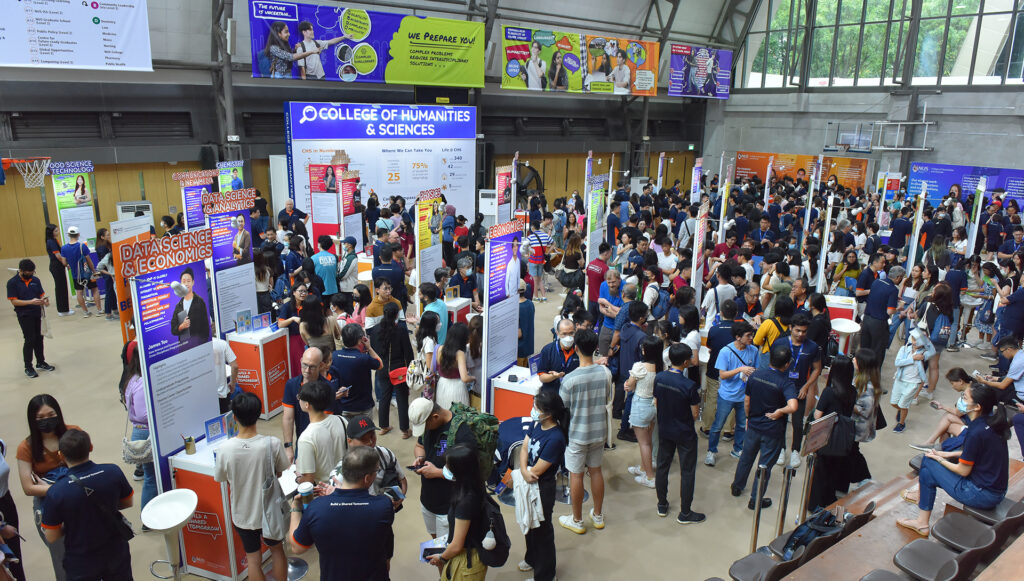
CHS, which provides an enhanced undergraduate experience for students of the Faculty of Science (FOS) and the Faculty of Arts and Social Sciences to pursue breadth and depth across academic disciplines, showcased its Common Curriculum throughout the Open House.
Currently accepting its third intake, it held talks on hot topics such as sustainability, food science and technology, and mental health to demonstrate how students can apply various perspectives to address complex real-world issues.
The panel entitled “Why Sustainability and Climate Change Matter” saw speakers from the Geography, Japanese Studies, Anthropology and English, Linguistics and Theatre Studies departments weighing in on the topic from their respective disciplines. Another session by the Department of Food Science and Technology explained how its programme applies principles from chemistry, biology, engineering and nutrition to address issues such as food safety and security, as well as the careers its graduates can pursue.
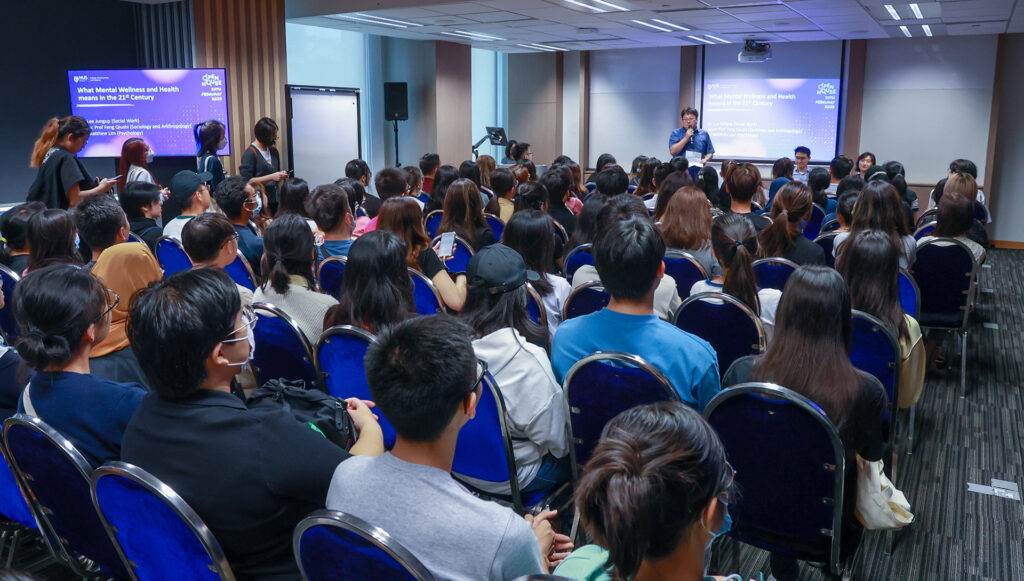
In the same vein, the panel “What Mental Wellness and Health Means in the 21st Century” saw speakers from the Social Work, Sociology and Psychology departments discuss perceptions of mental health in society. Dr Lee Jungup, an Assistant Professor in Social Work, pointed out the close relationship between social work and psychology. “Many of our Social Work students consider a double major with Psychology,” she said, noting that social work emphasises the practical while psychology is more theoretical and clinical in nature.
Jasmine, the NYJC alumna, said the various informative talks reaffirmed her decision to apply to NUS. “The NUS College tour as well as the CHS Common Curriculum sharing were particularly informative. They made the programmes seem quite appealing and I am looking forward to applying for both,” she said.
For some like Christian Chua, an alumnus from the NUS High School of Math and Science, attending the Open House talks helped clarify the career options available for the different programmes.
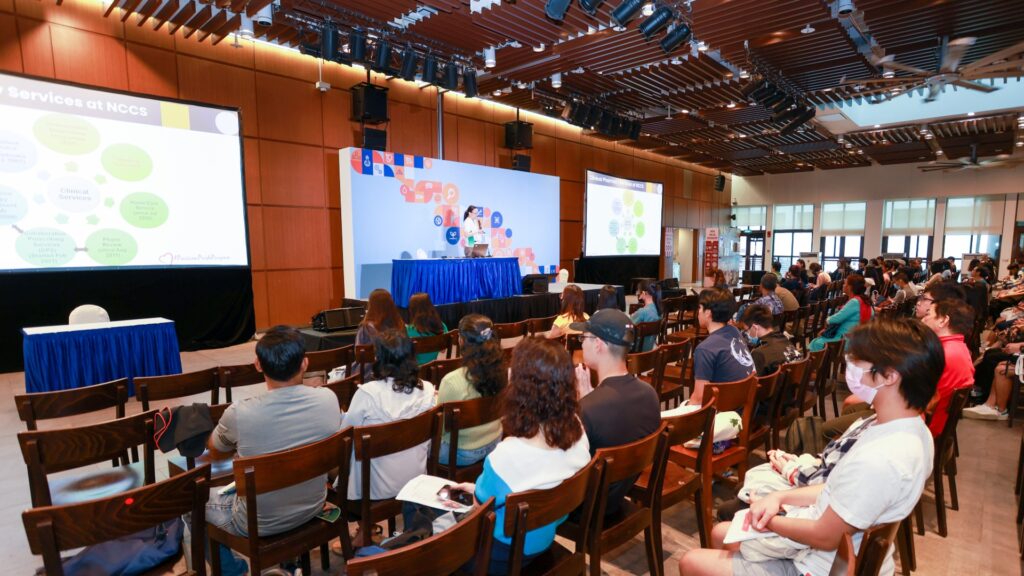
Christian, who is currently considering the Medicine, Pharmacy, and Pharmaceutical Science programmes, attended the Pharmacy talk and booth, where faculty members of different specialisations touched on the various career pathways and the collaborative practices of the discipline.
“It was useful that they discussed the different careers that Pharmacy graduates had gone into so I knew a degree in Pharmacy wouldn't just limit me to community or hospital pharmacy but also to the R&D, drug approval side, or the business side as well,” he said.
Shaping the Future of Design and Engineering
Meanwhile, there was action aplenty over at both the online and in-person Open House by CDE, which is accepting its second intake. Officially launched in November 2021, CDE was a merger of the Faculty of Engineering and the School of Design and Environment, ramping up the distinctive interdisciplinary experience at NUS.
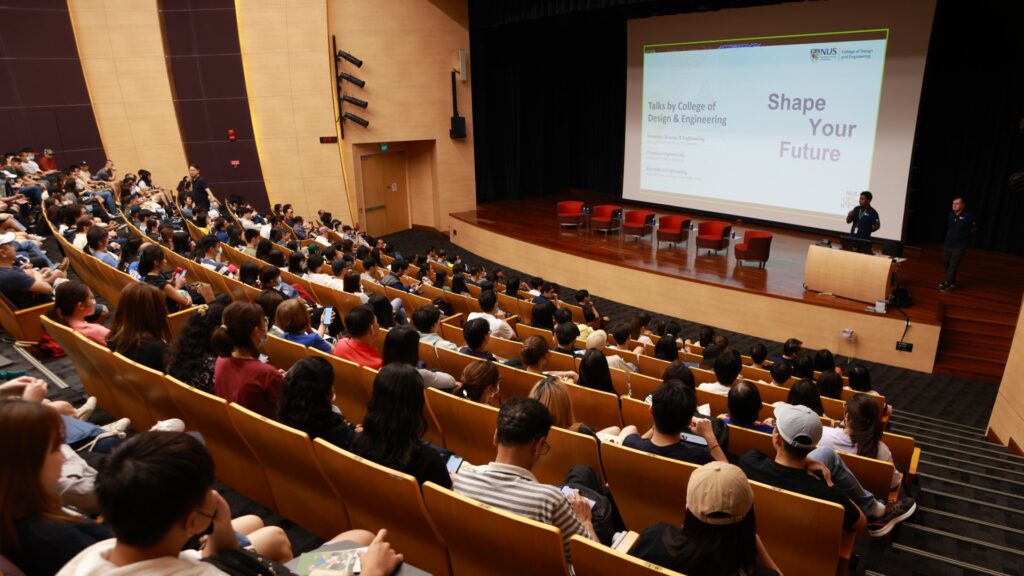
From the Common Curriculum and the multidisciplinary education model, to the Student Exchange Programme and future career prospects, CDE faculty and students shared their insights on a plethora of topics with prospective students.
The talks, such as the one on Biomedical Engineering, Chemical Engineering and Materials Science & Engineering, also provided valuable information. Prospective students learnt how undergraduates are exposed to a range of interdisciplinary topics with global-scale applications in class, and how NUS engineers are taking on the world’s biggest challenges, such as clean energy.
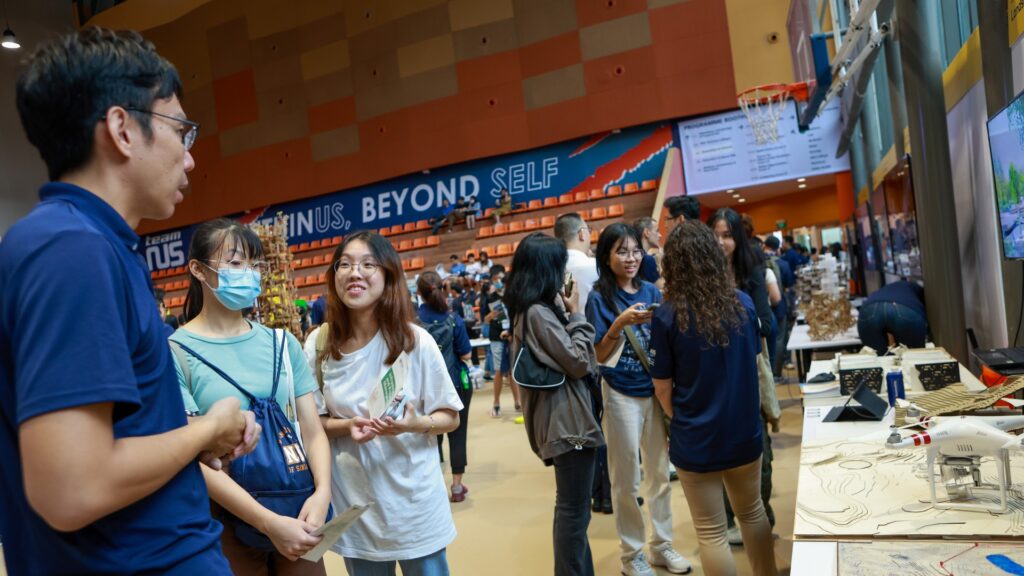
The talk on Architecture, Industrial Design and Landscape Architecture also saw a large turn-out. Discussing the breadth and depth of CDE’s curriculum, it touched on how students will be equipped to face the 21st-century challenges through their education in CDE.
Kaisyn, who is graduating from Nanyang Polytechnic this year, said, “I appreciated that they covered the basic skills and activities done throughout the curriculum. It allowed me to confirm that the Industrial Design course is relevant to my study and career plan.”
The in-person Ask-Me-Anything sessions with student panels also allowed participants to get their burning questions answered.
Tee Jia Hong, a graduate of Anglo-Chinese Junior College who intends to apply to Industrial and Systems Engineering (ISE) and attended the student sharing, said, “By listening to the experience from the ISE senior, I am able to get the hang of the academic and co-curricular prospect of being an ISE student.”
Over at CDE’s Rise of the Robots campus tour, participants were given a look at the Advanced Robotics Centre, which displayed projects such as an autonomous wheelchair, an artificial robotic arm, and a haptic feedback machine.
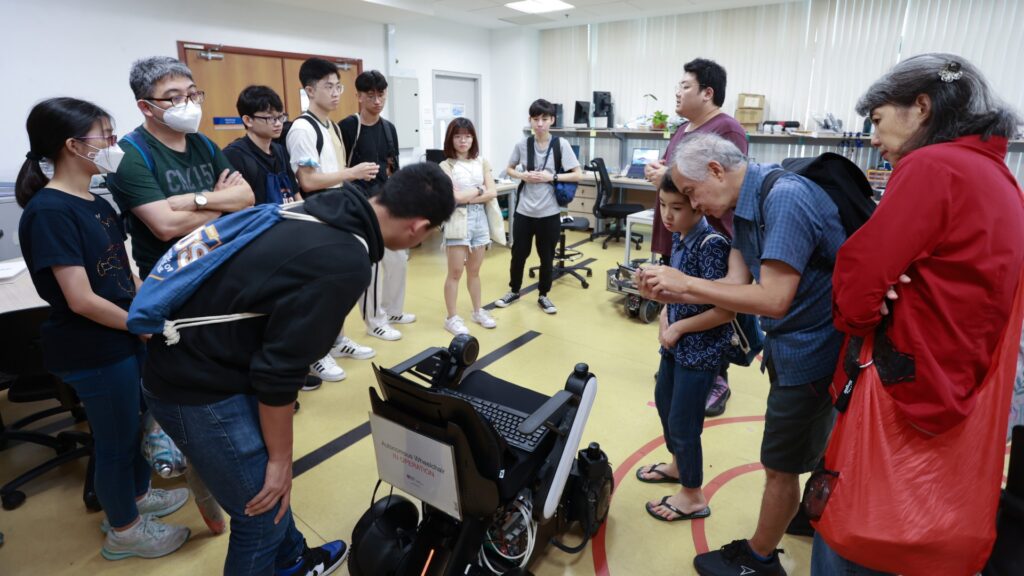
Robert Lim from Singapore Polytechnic, who attended the tour, said, “It was a memorable experience . . . I was able to learn more about what the courses have to offer and what undergrad students have accomplished in NUS.”
Exploring experiential learning
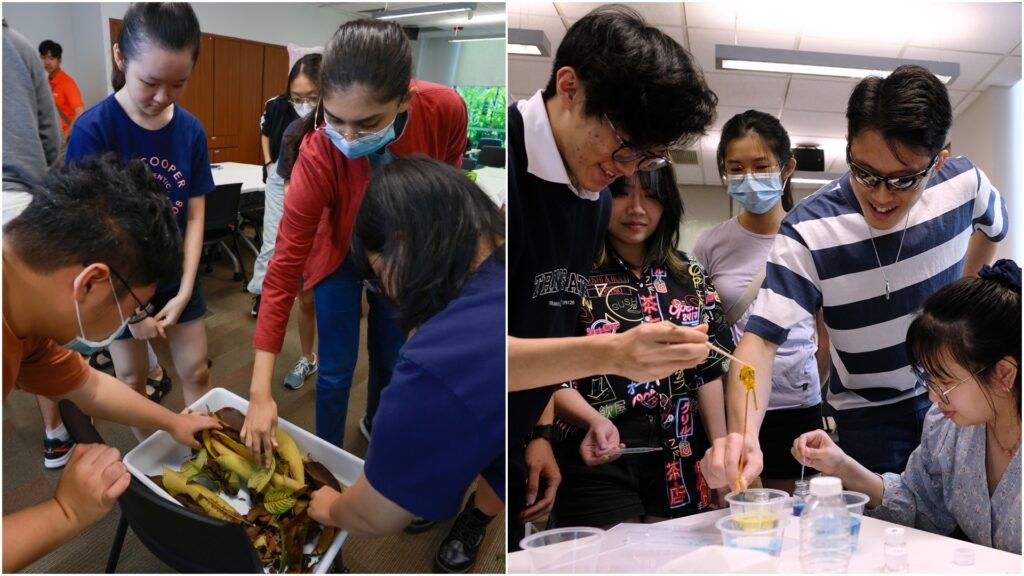
NUS College, Singapore’s first honours college, offered a glimpse of its flagship experiential learning programmes during its online and physical showcase. Faculty members highlighted the Impact Experience programme, where students develop solutions to real-world issues with community partners, and the Global Experience programme, which immerses them in global cities for specially curated courses and field visits based on specific themes.
The college, which is accepting its second intake, also held special classes for prospective students to get a feel of its small-group seminar-style lessons. Dr Ang Yuchen’s special class introduced his field course Biodiversity and Natural History in Singapore, which combines scientific concepts with the visual and language arts and environmental philosophy.
“I found the sample lessons useful in helping me not just get a sense of how lessons are conducted over at NUS College, but also how my potential Profs are like as teachers and facilitators,” said Eugene Teo, an alumnus of Raffles Institution, explaining that small, collaborative discussions was better suited to his learning style. Attending the Open House “also gave me a better understanding of the people I will be interacting with and the environment in which I would be studying in upon entering university life”, he added.
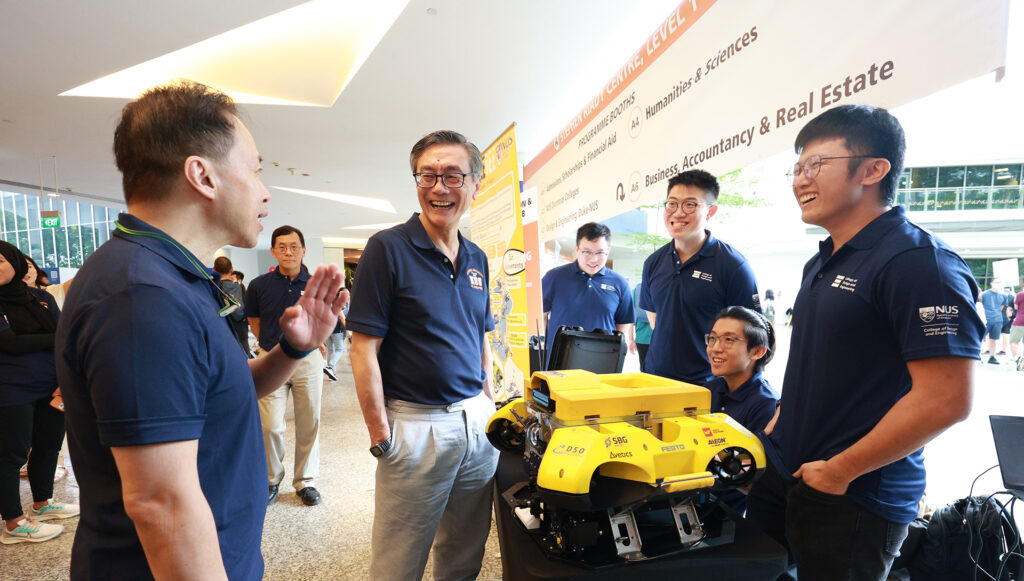
Interactivity was a prominent feature of the Open House. NUS Nursing offered visitors a chance to try basic wound treatment and resuscitation, while NUS Law held moot demonstrations at its Bukit Timah Campus.
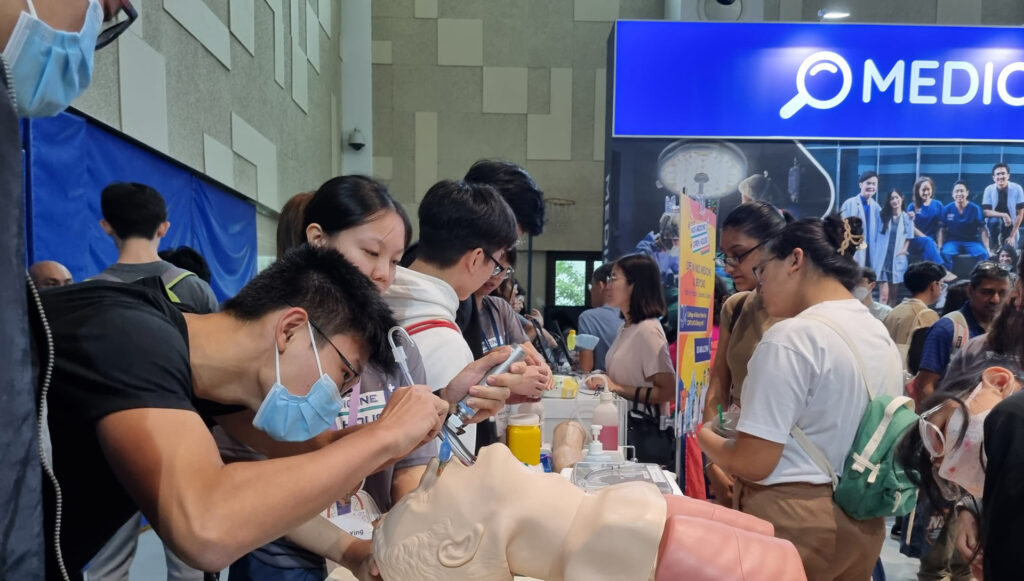 |
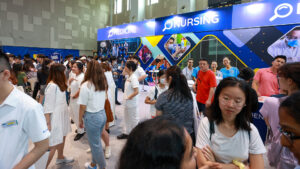 |
Aqirah Bte Azam, who will be graduating from Temasek Polytechnic in May, had the chance to see the Nursing students in action and attended a talk by its alumni. “Hearing their experiences in NUS and their careers have given me the courage to pursue my aspirations in nursing”, she said.
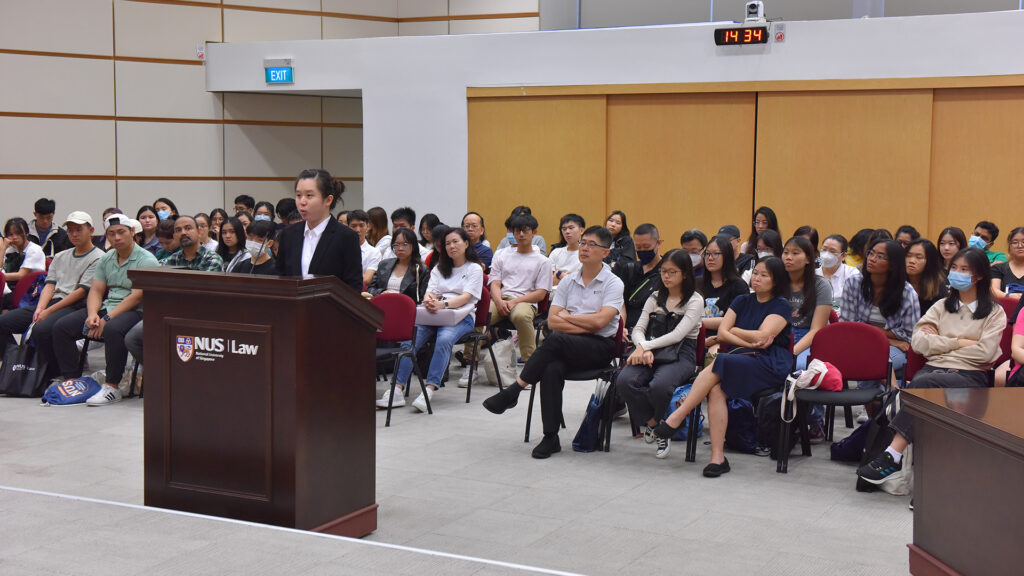
Smorgasbord of Student Life
Visitors also got a taste of the vibrant NUS student life on display. Student clubs and societies, as well as the Hall and Residential College (RC) interest groups, put their best foot forward at the Student Village.

Visitors were wowed by the striking moves of NUS Wushu, the energetic cheerleading displays of King Edward VII Hall’s KE Titans, and the snazzy K-pop dance moves of the Korean Cultural Interest Group. They were also treated to renditions of catchy tunes from Mandopop group NUS CAC Voices, acapella group NUS Resonance, Raffles Hall rock and jazz band RHockerfellas, and many more.
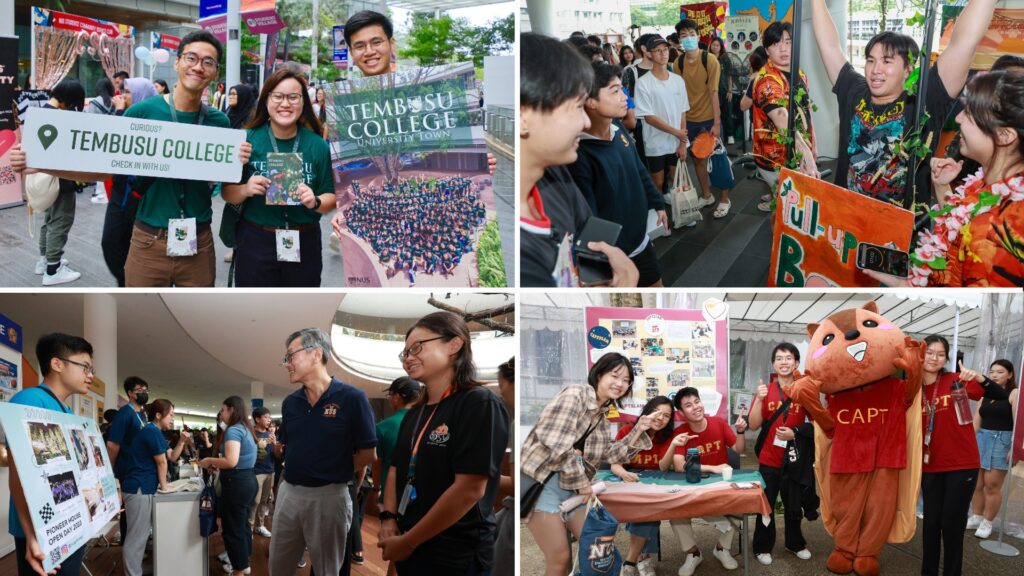
Representatives from the RCs, halls, and houses were present to offer prospective students the inside scoop on the on-campus experience. Complemented by A-Day-in-the-Life videos and 360° virtual tours, the booths, talks, and Ask-Me-Anything panels by student leaders gave participants a sense of the residential options at their fingertips.
“The House Life talk was the most enjoyable and informative event to me since the masters and students really explained to me what living in houses was like, while keeping us engaged through jokes and videos,” said Jia Hong.
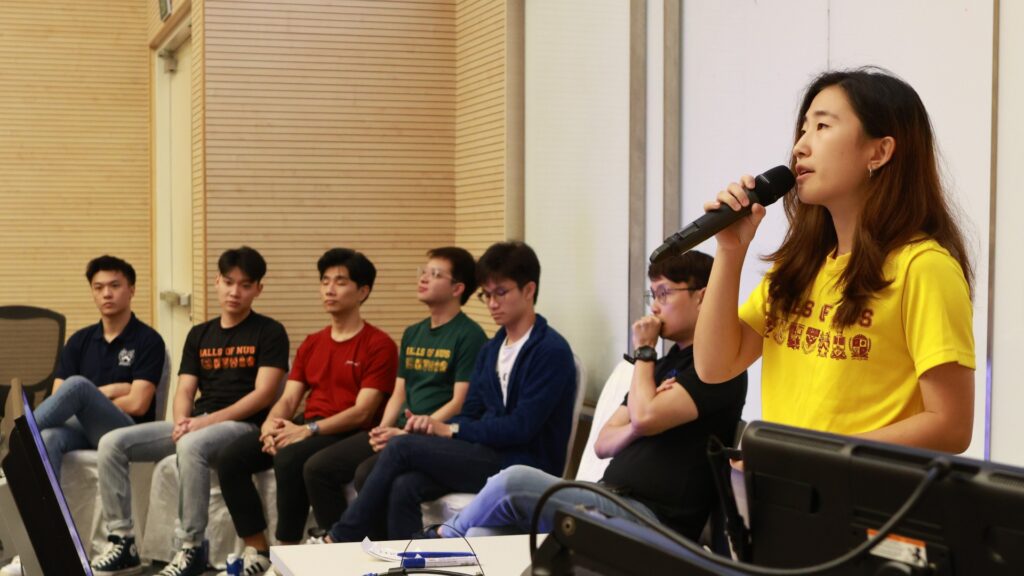
Charlotte Toh from Singapore Polytechnic, said the Halls talk helped her better understand the hall culture and admission criteria.
Guided in-person tours of the various halls and residences, such as King Edward VII Hall, Tembusu College, Ridge View Residential College, and Residential College 4, opened a window to the close-knit community of residential life.
Samuel Liu, who graduated from National Junior College, said, “The well-guided tours and booths set up for each RC that I visited gave me a good indication of which RC would be most suitable for my character and goals.”
This story first appeared on NUSnews on 9 March 2023.
The NUS Career Compass 2023
IN BRIEF | 5 min read
- Find out how the University has developed and broadened our curriculum to better prepare our graduates for the swiftly evolving workplace, and how interdisciplinary learning can help students solve complex issues in our society.

In collaboration with CNA938
How does NUS cultivate highly sought-after talents in the workforce of the future?
Find out how the University has developed and broadened our curriculum to better prepare our graduates for the swiftly evolving workplace, and how interdisciplinary learning can help students solve complex issues in our society.
This story first appeared on NUSnews on 23 February 2023.
CHS at NUS Open House 2023: Download the FASS Essentials on 27 February 2023
IN BRIEF | 10 min read
- On 27 February, get the full download on the essentials of academic programmes, student life, career preparation, overseas opportunities and financial aid at CHS via Zoom in the ‘virtual’ edition of CHS@NUS Open House 2023.
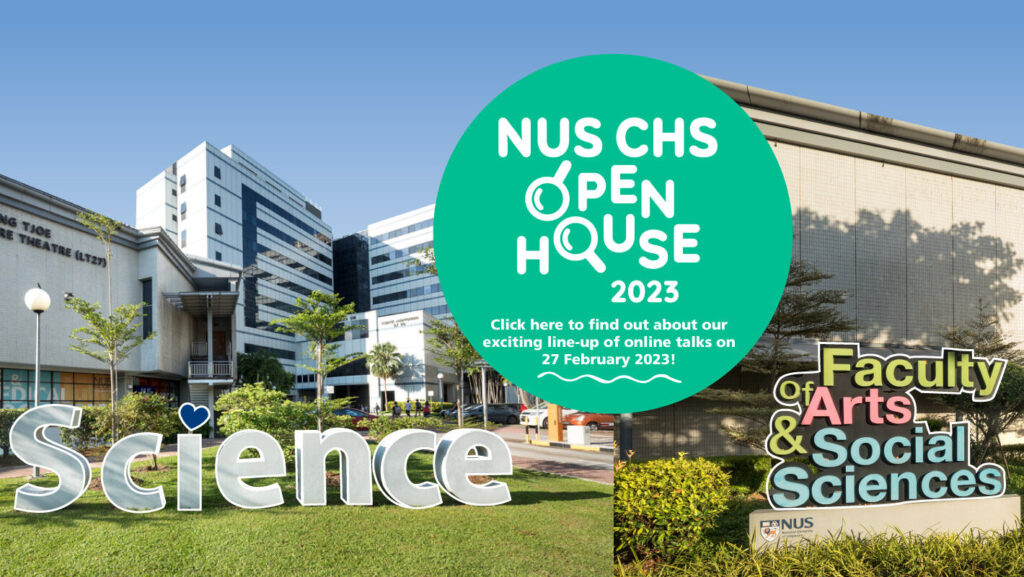
If you have not already marked your calendars for two dates with the NUS College of Humanities (CHS) during NUS Open House 2023, do it now!
On 27 February, get the full download on the essentials of academic programmes, student life, career preparation, overseas opportunities and financial aid at CHS via Zoom in the ‘virtual’ edition of CHS@NUS Open House 2023. Go to https://bit.ly/CHSatNUSOH2023-Virtual for the full 27 February programme.
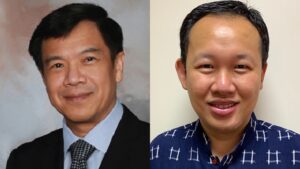
Then prepare to come on-campus on 4 March to engage with our award-winning faculty members, advisors and students to experience interdisciplinary education and explore your future vocation. Go to https://bit.ly/CHSatNUSOH2023-OnCampus for the full 4 March programme.
To help you plan your way through the lineup of FASS-specific talks and activities, read on for some of our highlights on 27 February 2023 that ought not to be missed.
Academics at the Forefront
The online edition of CHS@NUS Open House is meant to provide you with as comprehensive a briefing of what CHS, and its component Faculties of Arts and Social Sciences, and Science, have to offer students.
Academics is at the forefront and the day starts with a session devoted to the CHS Core Curriculum (9:00 – 11:00 am), a specially curated interdisciplinary programme that provides unprecedented freedom to choose the pursuit of breadth and depth across a broad spectrum of disciplines. This session will be led by Professor Sow Chorng Haur, Vice Dean (Outreach & Admissions), NUS Faculty of Science (FoS), and Dr Noorman Abdullah, Assistant Dean (External Relations & Student Life), FASS.
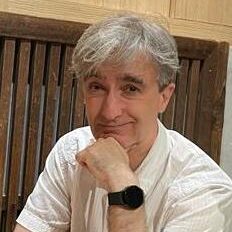
Associate Professor Luke O'Sullivan
The CHS Cross-Disciplinary Programmes
Three one-hour talks devoted to introducing Cross-Disciplinary Programmes (XDPs) offered by CHS will be running concurrently from 11:00 am. One programme FASS offers that embodies the concept of interdisciplinarity is the Philosophy, Politics, and Economics XDP, and the session for that will be led by Associate Professor Luke O’Sullivan (NUS Political Science) in discussion with fellow PPE Joint Programme Committee member, Dr Joel Chow (NUS Philosophy).
"This session is an opportunity to ask questions about the PPE-XDP. Philosophy, Politics, and Economics is a classic combination of disciplines that was first taught in Oxford and has spread globally because of its proven effectiveness. It brings together the ability to think about ideas in abstract and analytical terms, explore their practical implications for society, and model their costs and benefits in quantitative terms,” says Assoc Prof O’Sullivan. “PPE students can expect to develop a unique knowledge base and set of skills that leaves them suited for a wide range of careers in today's complex and fast-changing world."
Attendees are required to come prepared, because in addition to providing an overview of the PPE-XDP, Assoc Prof O’Sullivan expects audience engagement. Join the PPE-XDP session on 27 February at 11:00 am here.
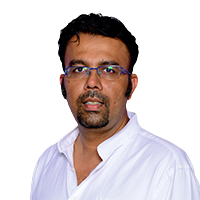
Associate Professor Rajesh Rai
Asian Studies @ CHS
NUS is recognised as a global centre of excellence in Asian Studies, where a multidisciplinary and comparative approach to the study of Asia and its regions is adopted. The session on programmes by the various Asian Studies departments at NUS (2:00 – 2:50 pm) will feature Associate Professor Rajesh Rai (NUS South Asian Studies), Dr Faizah Zakaria (NUS Malay Studies), Associate Professor Tham Shiao Wei (NUS Chinese Studies), Dr Clay Eaton (NUS Japanese Studies) and Dr Mohamed Effendy Abdul Hamid (NUS Southeast Asian Studies).
“You probably hear a lot about how Asia is the largest continent in the world, with the greatest diversity of cultures, philosophies, political thought and economic might, as well as scientific and technological advancement,” says Assoc Prof Rai, offering up a brief on the discussion he will be leading as moderator. “This session will take you through an interdisciplinary journey through history and current affairs to show you just how influential Asia has been a force for change, both positive and negative, on the world’s stage.”
Join this session by clicking here.
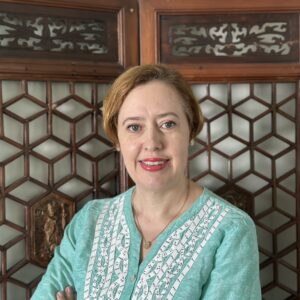
Humanities @ CHS
Learn more about the academic disciplines that focus on studying different aspects of the human condition from: Dr Donna Brunero (NUS History); Associate Professor John Whalen-Bridge, Associate Professor Graham Wolfe and Dr Leslie of NUS English, Linguistics and Theatre Studies; and Dr Zachary Barnett (NUS Philosophy).
“Do you: Ponder big questions regarding life, society, and culture? Wonder how language develops? Hold theatrical ambitions? Find yourself curious about connecting the past and present, the local and global?” session moderator Dr Brunero asks rhetorically. “If so, join us as we answer questions regarding our disciplines and share insights into how studying with us at NUS can broaden your horizons.”
To join Dr Brunero and her fellow speakers in this 3:00 - 3:50 pm session click here.
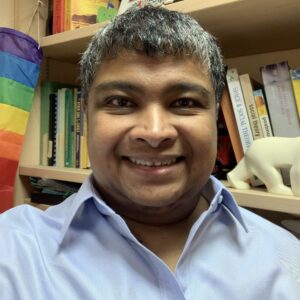
Social Sciences I: Same, Same but Different
This session features Dr Kamalini Ramdas (NUS Geography), Associate Professor Feng Qiushi (NUS Sociology and Anthropology), Dr Elaine Tan (NUS Political Science) and Dr Georgios Georgiou (NUS Economics), and will delve into their respective programmes as well as approaches toward forging a “collective identity”.
Session moderator Dr Kamalini explains. “This panel brings together social scientists from Economics, Geography, Political Science and Sociology to discuss what it takes to develop a collective identity as social scientists,” says Dr Kamalini, who will be working with her fellow speakers toward answering questions such as, “What are the benefits and challenges of a collective approach to learning and research? How might our students benefit from our commitment to engage?”
Click here to join the Social Sciences I (4:00 – 4:50 pm) session.
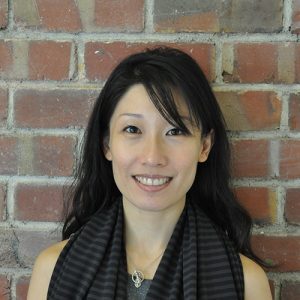
Social Sciences II: Understanding Social Complexity
Dr Adelyn Lim (NUS Sociology and Anthropology), Associate Professor Irene Ng (NUS Social Work), Dr Nina Powell (NUS Psychology) and Dr Alex Mitchell (NUS Communications and New Media) will be introducing the disciplines offered by their respective Departments, and show how they can each be applied to enable a deeper understanding of our world.
“The world we live in today can feel exciting but also downright contradictory. Global friendships are in many ways easier to make than in the past, yet we see terrorism, violent crime, wars, and enduring social inequality,” says session moderator Dr Lim, who will be discussing in detail with her fellow speakers complex issues thrown up by questions such as, “How did this world come about? Where are we heading in the future?”
To join the Social Sciences II (5:00 – 5:50 pm) session, click here.
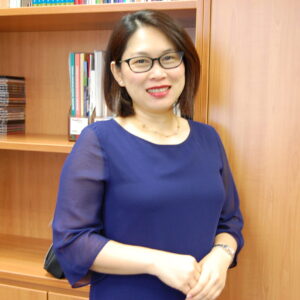
Ms Sasiwimol Klayklueng
Foreign Language Studies: Passport to the World
Meet leading Language instructors Ms Sasiwimol Klayklueng (Thai), Dr Sandhya Singh (Hindi and Tamil), Ms Indianti Tjan (Indonesian), Ms Rungnapa Kitiarsa (Thai) and Ms Sophie Undorf Bouvier (French), who will elaborate on the Minor in Language Studies and Proficiency Certificates conferred by the NUS Centre for Language Studies, which are very much sought after by students looking to enhance their career prospects.
The Half-life of Knowledge
IN BRIEF | 10 min read
- There is now an indisputable requisite to equip graduates with interdisciplinary knowledge and skillsets. We need both the agile lenses of interdisciplinarity as well as the deep-cutting laser of deep domain expertise. The former trains us to aim and focus the laser, while the latter allows us to cut to the heart of a problem.

| By Professor Tan Eng Chye |
“Teach a person to fish, and you may feed them for three-and-a-half years” may sound less inspiring than “Teach a person to fish, and you feed them for a lifetime”, but the former more accurately reflects the current realities of tertiary education.
Breaking news travels at warp speed, accelerated by social media and instant messaging. In a matter of minutes, news can reach the four corners of the world. Such interconnectedness highlights the leaps made in information technology over the years while underscoring a persistent and inexorable phenomenon – the reduction of the half-life of knowledge.
The half-life of knowledge, coined by Fritz Machlup in 1962, refers to the amount of time elapsed before half of the knowledge in a particular field is superseded or becomes obsolete. Given the speed with which knowledge develops and is shared, it is perhaps not surprising that this value is ever decreasing in many fields.
This phenomenon raises fundamental questions about our university degree programmes. How should a fresh graduate, filled with aspirations to change the world, deal with the harsh reality that a significant portion of their undergraduate training may be rendered irrelevant by the simple passage of time?
Distilling a degree programme is one possible, albeit drastic approach. We can consider equipping students only with evergreen core domain concepts. This training should take less time than our current degree programmes. As and when students require specific new knowledge, or need to upgrade existing knowledge, they can take short courses to bridge knowledge gaps and meet their professional needs. This type of “just in time” learning, also known as micro-credentialing, helps to circumvent the shortened half-life by injecting cutting-edge knowledge at just the right time.
Another less disruptive approach is revitalisation. We can maintain the current degree programme structure, but provide avenues for graduates to return to university in the future. Such short stints of study can follow existing models for bite-sized, self-contained courses, or semester-long study periods undertaken with the support of employers.
One certainty is that university study will cease to be just one stage of life. Instead, “university studies” will become the de facto way of studying, with a person continually refreshing and renewing their knowledge in tandem with or in anticipation of developments in industry, society and the world.
In anticipation of this, we created the NUS Lifelong Learners Programme (or NUS L3), which promises a 20-year period of student enrolment, from the point of undergraduate or postgraduate admission. In other words, a graduate of NUS can choose to come back to campus to take courses for at least 20 years from the day of matriculation.
Interdisciplinarity
Beyond the way knowledge is acquired, we are also grappling with working in an increasingly VUCA (volatile, uncertain, complex, and ambiguous) world. In such a context, can we continue to hold a siloed view of domain disciplines? In training law students, for example, we would be remiss not to show them basic programming, which can allow them to create customised commands to quickly and easily trawl through databases, with millions of legal records, to identify precedents.
Deep domain expertise is like a laser – a focused beam of knowledge that can cut through dense problems. However, real-world issues are increasingly multifaceted and ill-defined, often lacking a clear vulnerable spot at which a laser beam can be aimed.
As a mental experiment, consider the challenge of introducing autonomous electric vehicles to a city. This proposition involves urban design, city planning, the law, and engineering for accessibility. We can form a multidisciplinary team of experts, where each member is a domain expert, to tackle the issue. However, in all likelihood, we will encounter misalignment between domains, simply owing to differences in problem-solving methodology, thinking models or even nomenclature.
If we liken domain training to equipping students with specific lenses through which they can see and focus on information to solve a problem, then interdisciplinarity suggests that we should train students to operate across more than one domain. By educating them in core ideas from multiple domains and providing opportunities to apply their knowledge in authentic settings, students with interdisciplinary training can switch domain lenses as needed, solving problems using novel and unorthodox approaches that transcend domains.
To be clear, we are not advocating for dismantling deep domain training. Rather, we recognise that there is now an indisputable requisite to equip graduates with interdisciplinary knowledge and skillsets. We need both the agile lenses of interdisciplinarity as well as the deep-cutting laser of deep domain expertise. The former trains us to aim and focus the laser, while the latter allows us to cut to the heart of a problem.
NUS strongly believes in providing interdisciplinary pathways for our students. In 2020, we created the College of Humanities and Sciences (CHS) to provide an enhanced interdisciplinary undergraduate experience for students of the Faculty of Science and the Faculty of Arts and Social Sciences. CHS undergraduates can choose between deep domain training or the flexibility of interdisciplinary training of varying breadth and depth in modules offered by both faculties. Continuing our efforts to pave more interdisciplinary pathways for students, in 2021, we merged the School of Design and Environment and the Faculty of Engineering to form the College of Design and Engineering. More recently, NUS launched NUS College, Singapore’s first honours college offering pathways to more than 50 majors across a half dozen degree programmes. The aim of NUS College, as explained by its inaugural dean, Professor Simon Chesterman, “[is to offer] broad, interdisciplinary competencies that equip students for life, along with the opportunity to dive deep into areas in which you are passionate.”
To quote Charles Dickens, “It was the best of times, it was the worst of times, it was the age of wisdom, it was the age of foolishness.” Indeed, our experiences with the global pandemic and its effects on education over the past two years have given us the rare opportunity to engage in deep reflection and introspection. Witnessing the breakdown of resistance to adopting and adapting technology for teaching and learning during this time, we should be emboldened to re-examine and revolutionise some of our established, and perhaps outmoded, notions of how to offer higher education.
About the Author
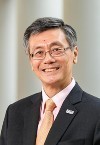 Professor Tan Eng Chye is President of the National University of Singapore. A passionate academic and educator, Prof Tan is a member of the World Economic Forum’s Global University Leaders’ Forum, as well as Singapore’s Future Economy Council, which is tasked with driving the growth and transformation of the country’s future economy.
Professor Tan Eng Chye is President of the National University of Singapore. A passionate academic and educator, Prof Tan is a member of the World Economic Forum’s Global University Leaders’ Forum, as well as Singapore’s Future Economy Council, which is tasked with driving the growth and transformation of the country’s future economy.
This article was first published in the Times Higher Education World University Rankings 2023 supplement and first appeared in NUSNews on 4 November 2022.



